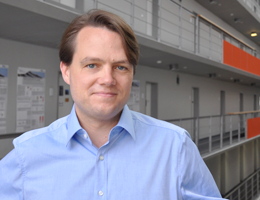Leopoldina: Professor Veit Hornung added as a member
 Veit Hornung
Veit Hornung
In his research, Professor Veit Hornung is concerned with the innate immune system and its function, to ensure the integrity of the organism against microbial pathogens or endogenous danger signals. A particular focus of his work are the mechanisms of foreign recognition, which are accomplished by so-called pattern recognition receptors. In this young field of research, the group of Veit Hornung could provide some important contributions through the discovery of ligands, receptors, and the decryption of their signal transduction cascades. This enabled the group of Professor Hornung, among other things, to characterize key components of the signaling pathways that play an important role in the detection of intracellular DNA.
Professor Hornung, who followed the call to the LMU last year, studied medicine at the LMU, with stays at Harvard University, Boston, USA, and the University of Zurich, Switzerland. In 2004 he received his doctorate at the LMU for Dr. med.. From 2003 to 2006 Hornung worked as a research fellow in the Department of Clinical Pharmacology (headed by Professor Stefan Endres) on the Klinkum of the University of Munich. Later he conducted research as a postdoctoral research fellow in the "Division of Infectious Diseases and Immunology" at the University of Massachusetts Medical School in Worcester, USA, until 2008. Back in Germany, Veit Hornung held a Professorship of Clinical Biochemistry at the University Hospital of the University of Bonn. There he was director of the Institute for Molecular Medicine, from 2014 to 2015, before moving to the LMU.
Hornung was elected to the Section Microbiology and Immunology of the Leopoldina. The Leopoldina is one of the oldest scientific academies in the world. Founded in 1652, it is committed to the free science for the benefit of people and shaping the future. With approximately 1,500 members, the Leopoldina gathered outstanding researchers from Germany, Austria, Switzerland and many other countries.